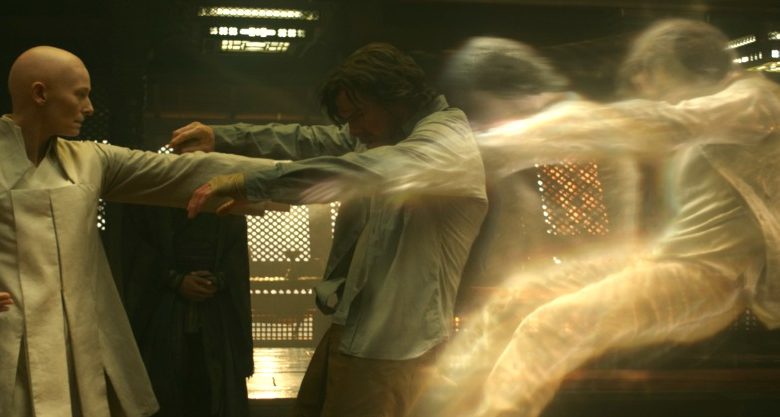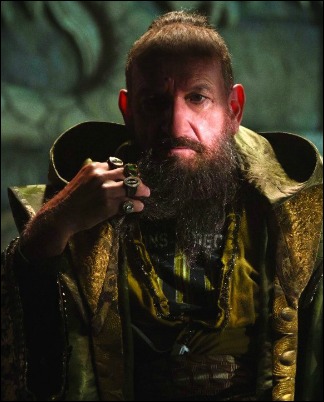8 Times Hollywood Bowed to China

Many were outraged when the film version of the Marvel Comics sorcerer changed an iconic character’s identity.
Out went the Asian Ancient One. Enter the formerly ginger-haired Tilda Swinton as the very female, very Caucasian Ancient One.
Another example of Hollywood white washing? More like capitulation to Chinese censors. Again. Here’s “Dr. Strange” screenwriter C. Robert Cargill explaining the situation to YouTube’s Double Toasted:
The Ancient One was a racist stereotype who comes from a region of the world that is in a very weird political place. He originates from Tibet, so if you acknowledge that Tibet is a place and that he’s Tibetan, you risk alienating one billion people who think that that’s bulls**t and risk the Chinese government going, ‘Hey, you know one of the biggest film-watching countries in the world? We’re not going to show your movie because you decided to get political.’ If we decide to go the other way and cater to China in particular and have him be in Tibet… if you think it’s a good idea to cast a Chinese actress as a Tibetan character, you are out of your damn fool mind…”
Makes sense. Especially when you consider how often Hollywood has bowed to China in recent years.
Why? For the very reasons Cargill explains.
RELATED: Leo Hails China’s Eco-Measures While Citizens Choke
An industry teeming with stars who rage against alleged clampdowns on free speech can’t stop censoring themselves if it means extra cash. Artistic integrity? Tell it to the bean counters.
Here are eight other examples where Hollywood has bowed to China for the almighty dollar.
- ‘Django’ Chained Up – Does anyone love movies and movie lore more than Quentin Tarantino? Yet when it appeared Chinese censors wouldn’t allow his film “Django Unchained” to be shown in theaters Tarantino OK’d slicing and dicing select scenes to appease Chinese censors. The new, less graphic edition finally made its way to Chinese theaters. Spoiler alert: The film flopped in the country all the same.
- New, Not Improved Mandarin – The Chinese-born Mandarin is one of Iron Man’s classic foes.
But when he made his debut in “Iron Man 3” he hardly resembled his old self. He did, however, look an awful lot like Ben Kingsley. Why? The change made sure the movie wouldn’t offend Chinese censors. The production didn’t stop there. A version of the film shown in China featured a heroic Chinese character helping Tony Star with acupuncture along with other pro-China tweaks.
- ‘World War’ Retreat – The Brad Pitt zombie romp originally fingered China as the source of the undead outbreak. That didn’t sit well with the film’s producers, who coaxed the creative team to point to another country as the zombie source.
- Less ‘Red’ Dawn – The “Red Dawn” remake took its sweet time hitting theaters, Bankruptcy woes played a starring role in the delay. That wasn’t the only roadblock. MGM ordered the film’s villains, an invading Chinese invasion force, to be changed to North Koreans so as not to offend Chinese censors.
- Men in Black and Blue: The Will Smith-Tommy Lee Jones franchise got a serious makeover prior to the third film’s release. Thirteen minutes got lost in a hurry for fear of offending Chinese censors. One sequence had Smith’s hero erasing the memories of several Chinese characters. That evoked thoughts of Internet censorship. Another clipped moment involved evil aliens disguised as Chinese characters. Snip, snip snip.
- Tear Down That Wall: How out of control were those ’80s video games from “Pixels?” They shattered a hole in the Great Wall of China before being stopped by Adam Sandler and co. Only that scene never got shown in theaters. Nor did a suggestion that Chinese villains could be behind the video game assault. We learned the truth about the late revisions thanks to the Sony email hack which sent the studio into a PR tailspin.
- Censored, James Censored: The smash “Skyfall” featured a small moment when an assassin infiltrates a Shanghai financial building. Snip, snip. T.J. Green, the CEO of Apex Entertainment, told NPR that scene showed a Chinese infrastructure as vulnerable to outside attacks. That kind of imagery doesn’t illustrate strength.
- Hung Out to Dry: This phenomenon is hardly new. In 2006, the third “Mission: Impossible” film featured Tom Cruise doing spy business in Shanghai. The sequence had Cruise walking past both lit home and houses where the owners hung their clothes outside to dry. That hardly fit the image of a developed nation. So the sequence got cut.

 But when he made his debut in “Iron Man 3” he
But when he made his debut in “Iron Man 3” he
It’s a “racist stereotype” to show elderly Chinese people as really smart and awesome at fighting? Come on!